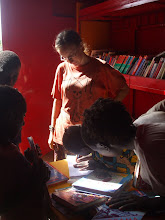Korite in Keur ALi Gueye was very different from the one I experienced in Thies. In the village, everything is so communal; there's not a party if tons of people don't show up. In Thies, I remember, my host family killed probably half a dozen chickens and cooked up huge plates of yassa - onion sauce - over rice, served with chicken meat, for the family and a few guests. For Korite in the village, they killed a cow and the various families all went to buy a couple kilos of beef. Then, we all cooked the same thing, like we did for Tabaski: a meat sauce, heavy with oil, made with onions, fried potato slices, macaroni, and seasoned with plenty of mustardand vinegar. The men went off, as they tend to do, to eat the meal together, and afterwards the women of the neighborhood gathered in a courtyard to share bowls of the sauce, to be sopped up with bread. Everything shared, everyone participating. For them, Koritewas also a day off, and the very next morning people were back to work, because now the harvest is really beginning.
Every day now there is some kind of work to do harvesting the crops. The past few mornings, after breakfast, I've headed out to my host family's enormous millet field to pick my way through the flattened stalks, searching out the candles and slicing them off with my new "goban" - my knife for cutting throughmillet stalks. It's quick work, once you get the hand of it, and we've managed to hack our way through maybe a quarter of the field in two days. The result is two huge stacks of millet, laid out on beds of dried leaves in the midst of the field, which will be gathered up later and stored in my backyard. It's really a lot of millet. Known to youas birdseed; known to me as dinner. Meanwhile, the peanuts are ripening quickly as well. I've made several trips back and forth to a couple peanut fields, to do my part in collecting them. The nuts are sold in big sacs, and the leaves are kept, too, to be dried into hay for horses during the coming dry season. When I filled my water bucket full of peanuts and had them counted out (measured by the comato can), I found I'd gathered 10 cans-full, which, being given 25cfa a can, came out to 250cfa. That's about 50cents! The next day I only filled seven cans, and made 125cfa. The peanut owners are insisting on paying me, just like everybody else, but while it's nice to be treated the same as everyone, I'd rather not take their money. Luckily they don't usually have it right away, as it comes in only after they've sold the crop, so maybe if I don't ever mention it again they'll forget the 250cfa... if not I'll have to spend it on tea and sugar to give right back to them.
Monday, October 6, 2008
Subscribe to:
Post Comments (Atom)


No comments:
Post a Comment